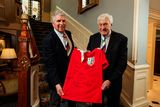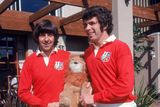Injury ended my career… but I was lucky: ‘Invincible’ Lion Dick Milliken


It’s 1975. Dick Milliken has just been part of the British Lions tour to South Africa a year prior — the famous ‘Invincibles’ — and had firmly established himself in Ireland’s centre pairing alongside fellow Ulsterman Mike Gibson.
Life is good. He’s thinking about going on a second Lions tour to New Zealand in two years’ time. There’s many more Ireland caps to win beyond the 14 he’s already got, and his hometown club of Bangor are flying high under his captaincy.
And then in one fell swoop it’s all taken away.
In what Milliken himself describes as a “fairly meaningless” Ulster trial match, the 73-year-old took contact and instantly knew something was wrong. He’d broken his leg and ankle in the same moment and, with it, his career immediately came to an end.
While he would recover enough to return to club action for Bangor, predominantly with their Seconds, he would never pull on a green jersey again, and his hopes of a second tour with the Lions evaporated then and there. It was about as cruel a blow as you could inflict on a young, up-and-coming star who had the world at his feet.
And yet now, reflecting on the incident a whole 50 years on, there’s no bitterness that you would perhaps expect from someone who could have gone on to become a multi-year tourist with the Lions, or be talked about in same revered circles as Gibson.
Rather, perspective is provided much closer to home.
“Three weeks after (my incident), the guy playing in the same position as me for Bangor took a knock and broke his neck, and he spent the rest of his life in a wheelchair,” says Milliken.
“I always thought it was so simple when I broke my ankle, but that could have been me playing for Bangor. So while, yes, it was a career-ending injury, it was just my ankle. Sadly, for him it was life-changing.
“You hear the boys talking about going back to New Zealand and obviously I think yes, I would have liked another crack at it, and I had formed a great partnership with Ian McGeechan that we could have rekindled for the next tour, too. I would have loved it to have been longer.
“I also could have broken my ankle in school and never even gotten a chance. I met a guy recently who did that, a very promising schoolboy player who suffered a career-ending injury in school.
“I’m grateful for what I got and wasn’t I lucky to do it with the Invincibles? If you could pick one out, that would be the one to do it with. And I do wish it could have been longer.
“But that poor incident for my team-mate in Bangor put it in perspective. That could have been me.”
Ian McGeechan (left) and Dick Milliken pictured during the British Lions tour to South Africa in 1974
Instead, he is happy to reflect on being part of what is unanimously agreed upon as being the greatest Lions tour the game has ever seen, the 1974 vintage going to South Africa and coming away with a record of 22 games played, 21 wins and just the one draw.
But for a controversially denied try in the dying stages of the fourth Test — Irish flanker Fergus Slattery adamant he had grounded the ball but referee Max Baise incredulously deeming it held up — they would have been perfect on a tour where Milliken was front and centre, partnering McGeechan in all four Tests, scoring a try in the second.
Legends all of them, led admirably by two Ulstermen in the form of proud captain Willie John McBride and coach, the late Syd Millar, and now they will head to the Culloden on June 20 for a reunion in aid of the Wooden Spoon charity, which is about to surpass £1m raised for children’s initiatives in Northern Ireland, supporting the likes of Daisy Lodge in Newcastle.
“I was very young, I was 23. The memories for me are very much rugby memories, the standard and the enjoyment of the rugby. It was tough, uncompromising, but you were also playing with guys whose legacies have stood the test of time,” recalls Milliken with a smile.
“Gareth Edwards is probably one of the best players ever. Phil Bennett, JPR, JJ Williams. The pack with Willie John, Ian McLaughlin, Slattery, Mervyn Davies. These are names that still would be, if there was such a thing, in the Hall of Fame, they’re all phenomenal players.
“South Africa was a beautiful place to play, it was conducive to playing great rugby, but for me it was about the people we were with. When you play any sport with good people, you always enjoy it and learn from them.”
It was, of course, a fairly controversial tour in many ways too, given the political background dogging South Africa at the time. Gripped in the ugly nature of apartheid, there were many calls for the Lions not to tour in the first place in protest at the racial segregation.
But from a sporting perspective, Milliken only has positive memories, not just on the pitch but seeing the excitement that encapsulated the nation, to the extent that they were always in the public eye.
“South Africa is a rugby-mad place and back in ’74 there was no television there, so people were travelling hundreds of miles just to watch the Lions, even just to watch us train,” he grins.
“As we kept winning, the aura around us got even bigger. They almost believed that Gareth (Edwards) was the Second Coming!
“South Africa had been isolated from top level sport for so long and they still believed that, although the Lions had beaten New Zealand in 1971, they were still the world champions even though there was no World Cup back then.
“It was hard for them to take that these ‘softies’ from the British Isles who were traditionally beaten up when they came to South Africa were suddenly winning, and winning comfortably.”
Read more
His career might have come to an end many years ago, but Milliken certainly hasn’t set rugby aside despite being busy with his other life as an accountant, which has seen him wear multiple hats as chief executive of both Investment Bank of Ireland, a director of Bank of Ireland Mortgage Bank and a non-executive director of Ryanair.
But among all that he has still remained heavily involved in the game with Ulster, where he remains a season ticket holder, while you can frequently see him down at Upritchard Park where he cheers on his beloved Bangor, even during the tough days after they were relegated from the All-Ireland League.
And he is very keen to see how a former ward of his, David Humphreys, gets on in his new position as the IRFU’s performance director. The pair worked closely together when Milliken was a selector for Ulster before the game turned professional, and the former Lion is intrigued to see how he gets on — particularly when it comes to sorting out his home province.
“David’s a very able guy and will do a great job in Irish rugby, he has the depth of knowledge and is progressive in his thinking, which is so important,” believes Milliken. “Ireland are great now, but it’s staying there which is the challenge. To get to number one is fantastic but now they have to stay there.
“Obviously Ulster is a pressing need, too. They’re having a tough time, both on the pitch and financially, so David will have to help them but he also has to be helping out the other provinces, too. But Ulster are a big priority.
“The other provinces have to be strong in order for Ireland to be successful long-term, they can’t rely on Leinster dragging them through every time.”



